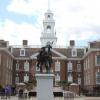Trust me - it’s not an easy concept.
But once you get it, you will agree. The National Popular Vote assures that the candidate who receives the most popular votes nationally is elected U.S. president. It assures a national result for our national elections. Right now, with thousands of elected officials nationally, only the office of president of the United States is elected by other than the majority of the popular vote.
Here’s how it works. States will continue to appoint their own electors to serve in the Electoral College. Those electors will cast their votes for the candidate receiving the most votes nationally. That person will be elected president.
What the NPV is not:
It does not repeal the Electoral College - it changes the process for the college.
It does not require a constitutional amendment - the Constitution, Article II, expressly allows state legislatures the right to select their electors “in such Manner as the Legislature may direct . . .” Enactment of the NPV by a state Legislature like the Delaware General Assembly is an exercise of this right.
It is not unconstitutional under the compacts clause - the United States Supreme Court has affirmed the legitimacy of interstate agreements like the NPV as long as the agreements do not “encroach upon or interfere with” the supremacy of the federal government. Because states are acting under their authority in Article II of the Constitution, the NPV does not have this effect and the agreement is permissible. Many such compacts are in place today.
It is not partisan - the NPV has been adopted by both Republican and Democratic state legislatures.
It is not academic - five U.S. presidents have been elected without winning the most popular votes.
It does not violate Delaware state law or the rights of any individual.
It is not contrary to the wishes of our founding fathers - the “winner take all approach” to presidential elections followed in 48 states, including Delaware, is not part of the U.S Constitution and is state, not federal, law.
It is not “mob rule” - it is an expression of majority rule, the foundation of our democracy.
Here is what the NPV is.
It is a statewide issue for Delaware – it enables Delaware voters to join voters in every other state to elect the person to fill the highest office in our country.
It is perfectly aligned with our fundamental principles of democracy.
It is a “compact” – in other words, a contract – among states to make majority rule the basis for election to the presidency.
This is not a pie-in-the-sky idea. Enactment takes adoption by states representing 270 Electoral College votes. Twelve states with 172 votes have already done this; the NPV is now being considered in another four states. Now Delaware has added its three Electoral College votes by adopting SB 22.
How would I feel if a candidate I supported won the presidency without also winning the popular vote? Yes, part of me would like that - but I would be troubled by what it meant for American democracy. I am a patriot before I am a partisan.
Moira K. Donoghue
Lewes























































